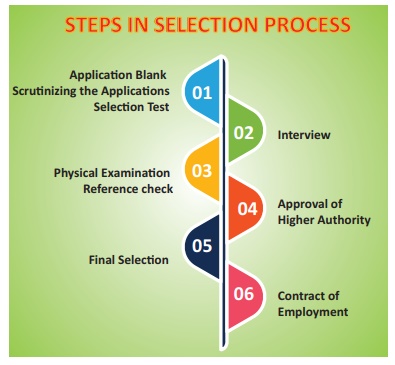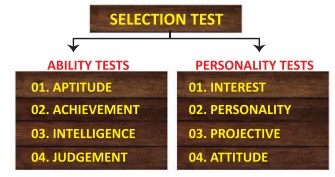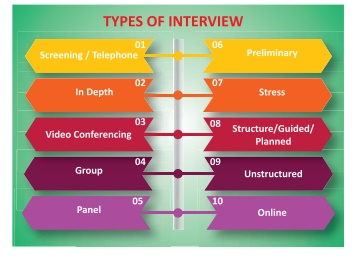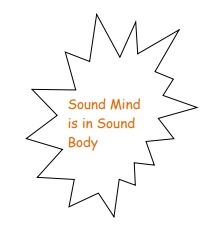Human Resource Management - Steps in Employee Selection Process | 12th Commerce : Chapter 11 : Human Resource Management : Employee Selection process
Chapter: 12th Commerce : Chapter 11 : Human Resource Management : Employee Selection process
Steps in Employee Selection Process
Steps in Employee Selection Process

A comprehensive selection process involves the
various steps as shown in figure
01. (a) Application Blank
Most of public sector undertaking, various ministries
of Government, Selection Commissions, Recruitment Boards and Private Sector
Companies either supply pre-printed application form or direct the candidates
to download the forms uploaded in their respective websites. In the case of
voluntary applications submitted by the candidates, they are issued application
form afresh at the venue of the interview to collect complete information about
the candidate in the standardized format. Selector can collate different types
of information from the application blank namely family background, educational
qualification, co-curricular activities, work experience, exposure to related
activities, scale of pay drawn, academic distinction, area of expertise and so
on.
01. (b) Scrutinizing the Applications
Where the applications received in response to
advertisement inviting applications for opening are more, it is not possible
for recruitment agency to call all the applicants for interview. Hence,
selection committee has to evolve some criteria like age, length of experience,
level of education, percentage of marks, higher qualification, level of
exposure, communal quotos, proficiency etc., to shortlist the number of
applicants for the interview.
01. (c) Selection Test
Several tests are conducted in the selection
process to ensure whether the candidate possesses the necessary qualification
to fit into various positions in the organization.

A. Ability Test
A test designed to measure an individual’s
cognitive function in a specific area, such as variety of skills, mental
aptitude, problem solving, knowledge of particular field, reasoning ability,
intelligence etc. This test is used to find the suitability of a candidate for
a given job role.
1. Aptitude test
Aptitude test is a test to measure suitability of
the candidates for the post/role. It actually measures whether the candidate
possess a set of skills required to perform a given job. It helps in predicting
the ability and future performance of the candidate. Aptitude test can be
measured by the following ways:
i) Numerical Reasoning Test - Numerical reasoning test
provides information about candidate’s numerical aptitude. In other words this
test measure the candidate's ability to make correct decision from numerical
data.
ii) Verbal Reasoning Test - It measures the candidate's ability
to comprehend the written text and ability to arrive at factual conclusion from
the written text.
iii) Inductive Reasoning Test - Inductive Test is one of the psychometric tests
conducted in the selection process to measure the problem solving abilities and
ability to apply logical reasoning.
iv) Mechanical Reasoning Test - This test measures the engineering student’s
ability to apply engineering concepts in actual practice.
v) Diagrammatic Reasoning Test - This test measures the candidate’s ability
to understand the shapes, abstract ideas and ability to observe and extract
values from illustrations and apply them to new samples.
vi) Spatial Reasoning Test - The test measures the
candidate’s ability to clearly manipulate and remember the shapes, still
images, and find out pattern which govern the sequence.
vii) Situational Judgment Test - This test measures the candidate’s ability to
choose the most
desirable action in critical situations using his judging ability.
viii) Mental Arithmetic Test - It tests the candidate’s basic numerical ability
like addition, subtraction, multiplication, division and fraction. It tests the
speed of doing calculation.
ix) Vocabulary Test - The test measures candidate’s ability
to recognize the relationship among the ideas, think methodically and fluency
in English language.
x) Number Sequence Test - This measures the candidate’s
ability to find a logic in a series or pattern. Under this test, candidates
have to find out missing number in a sequence to determine the pattern.
2. Achievement Test
This test measures a candidate’s capacity to achieve
in a particular field. In other words this test measures a candidate’s level of
skill in certain areas, accomplishment and knowledge in a particular subject.
The regular examination conducted in educational institution represents
achievement test. It is also called proficiency test. This test is conducted
before, during or after a learning experience. In short it is a test conducted
to find out candidate’s mastery over the subject. Example,
a) A driver may be asked to drive a vehicle to test
his driving efficiency
b) Music student may be asked to play a given
instrument
c) Teacher candidate may be asked to give a
demonstration
3. Intelligence Tests
Intelligence tests are one of the psychological
tests, that is designed to measure a variety of mental ability, individual
capacity of a candidate. The main aim of these tests is to obtain an idea of
the person’s intellectual potential.
Mental age and Actual (age wise)
calculate the Flow of IQ level.
Formula for IQ :
[ Mental Age / Actual Age ] x100
(Physical age or current age)
Mental age: A person’s mental age is a
measurement of their ability to think when compared to the average person’s
ability at that age.
Example: Average intelligence or Average IQ =
100If ten years old has a mental age 13, Therefore, IQ = 130, ie, Above
average.
4. Judgment Test
This test is conducted to test the presence of mind
and reasoning capacity of the candidates
B. Personality test
Personality test refers to the test conducted to
find out the non-intellectual traits of a candidate namely temperament,
emotional response, capability and stability. There is no right or wrong answer
in the test. It comprises of following tests.
1. Interest Test
Interest test measures a candidate’s extent of
interest in a particular area chosen by him/ her so that organization can
assign the job suited to his/her in term.
2. Personality Inventory Test
Under this method standardised questionnaire is
administered to the candidate to find out traits like interpersonal rapport,
dominance, intravertness, extravertness, self confidence, lower sign quality
etc. This test assesses the reliability and innate characters of the candidate
concerned.
3. Projective Test / Thematic Appreciation Test
This test measures the candidate’s values, attitude
apprehensive personality etc. out ofthe interpretation or narration given by
the candidate to the pictures, figures etc. shown to him in the test situation.
4. Attitude Test
This test measures candidate’s tendencies towards
the people, situation, action and related things. For example, morale study,
values study, social responsibility study expresses attitude test and the like
are conducted to measure the attitude of the candidate.
02. Interview
Next step in selection process is interview. The
term ‘interview’ has been derived from French word enter voir that means to
glimpse or to see each other .
In other words interview represents a face to face
interaction between the interviewer and interviewee. According to Scott and
others “an interview is a purpose full exchange of ideas, the answering of
questions and communication between two or more persons.”
Various
types of interview are shown in figure

02) Screening / Telephone Interview
Where the candidates live far away from
organization and find it difficult to attend preliminary interview for various
reasons, telephone interview is conducted by some organization to eliminate
unfit and unsuitable candidate at the preliminary stage itself.
02) In depth Interview
This
interview is conducted to test the level
of knowledge of the interviewee in a particular field intensively and
extensively. Thus interview helps the interviewers to learn about the
candidate’s expertise and practical exposure with respect to his/her area of
specialization.
03) Video Conferencing Interview
Video conferences interview is similar to face to
face interview. Video conferencing interview is a kind of conference call that
connects the candidate with companies located across various geographies. Just
like telephone call a video conferencing interview has multi point which allows
two or more people in different locations to participate in the interview
process. Interview can be conducted from a desktop at work, a home computer or
smart phone or a tablet.
04) Group interview
A group interview is a screening process where
multiple candidates are interviewed at the same time. Group interview is a good
time saving type of interview. Instead of spending 5 hours interviewing 5
candidates individually, one hour can be spent interviewing them in a group.
Some time particular topic is given to the group, and they are asked to discuss
it. The competency of members of group is assessed by keenly observing the
participation of members in the discussion.
05) Panel Interview
Where a group of people interview the candidate, it
is called panel interview. Usually panel comprises chair person, subject
expert, psychological experts, representatives of minorities/underprivileged
groups, nominees of higher bodies and so on. All panel members ask different
types of questions on general areas of specialization of the candidate. Each an
every member awards marks for the candidate separately. At the end, the marks
awarded by all the members are aggregated and the candidates are ranked
accordingly. This method eliminates bias in selection process. It ensures more
reliability in the selection of the candidate.
06) Preliminary Interview
This interview is conducted to know the general
suitability of the candidates who have applied for the job. Team of experts
conducts their interview primarily to eliminate those who are unqualified and
unfit candidates. This helps the employer organization to cut cost and time in
selection process.
07) Stress Interview
This type of interview is conducted to test the
temperament and emotional balance of the candidate interviewed. Interviewer
deliberately creates stressful situation by directing the candidate to do
irrational and irritating activities. They assess the suitability of the
candidate by observing the reaction and response of the candidate to the
stressful situations. Mostly this type of interview is conducted for recruiting
sales representatives staff for defence and law enforcement agencies.
08) Structure/Guided/Planned Interview
Under this method, a series of question to be asked
by the interviewer are pre-prepared by the interviewer and only these questions
are asked in the interview. Ultimately interviewees are ranked on the basis of
score earned by the candidate in the interview.
09) Unstructured Interview
This is quite contrary to structured interview. An
atmosphere for free and frank interaction is created in the interview
environment. There is no pre-prepared questions. Interviewers determine the
suitability of the candidate based on their response to the random questions
raised in the interview.
10) Online Interview
Due to tremendous growth in information and
communication technology, these days interviews are conducted by means of
internet via Skype, Wechat, Google duo,
Viber, Whatsapp or Video chat
applications. This enables the interviewers to conduct interview with the
candidates living in faraway places. They saves a lot of time, money and energy
both for employer's organisation and the candidate.
10 most common Interview questions
1. Tell me about (your self)
2. Why do you want to work for this
Organization?
3. Why are you interested in this
position?
4. Why should we select you?
5. What is your greatest strength?
6. Tell about the time, when you
failed?
7. What is your salary requirement?
8. What is your five year plan ?
9. Why are you looking to leave your
present job?
10. Do you have any questions for me!
03. (a) Physical Examination or Medical Examination

The last technique used in selection process is
medical examination. This is the most important step in the selection because a
person of poor health cannot work competently and any investment on him may go
waste, if he/ she is unable to discharge duties efficiently on medical grounds.
In other words, it determines an applicant’s physical ability to perform a
specific job. The main purpose of medical examination is to find out
1. Physical fitness of the candidate under
selection to the job concerned
2. To protect the existing employees of business
organization from the infectious diseases likely to be spread by the candidate
selected
3. To check excessive expenditure in the treatment
of selected employee after placement.
03. (b)Reference Check
Reference check is done to know reliability and
trustworthiness of the candidate. Usually application blank contains a column
for the candidate to furnish the list of persons to be contacted for reference
purpose. Employer organization used to send either standardized form to
referees or request them to write in detail about certain behavioral traits of
candidate under selection like conduct, character, attitude, behavior, value
system etc., of the candidate under selection process. The selector decides the
selection worthiness of the candidate based on the reference and recommendation
given by referees.
04. Approval by Higher Authority
Selection committee sends the list of candidates
selected with some candidate kept in waiting list for approval by higher
authority like chairman, HR director, CEO and the like. Once the list is
approved the selected candidate will be called for final interview.
05. Final Selection
The successful candidate who passed through various
stages of selection process will be called for final interview. These
candidates are briefied about the rules and regulations of the organization,
organizational culture, reporting relationship, dress code, expectations of
employer, facilities available for career growth etc. At the end of the final
interview even the candidate under selection is allowed freedom to seek
clarification or make his own demands if any.
06. Contract of Employment
After the final selection process is completed,
certain documents are expected to be signed both by the organization and the
candidate. Hence there is a need for preparing a contract of employment. The
following basic informationwhichneedtobeincludedinawritten contract of
employment varies according to the level of the job. Generally it contains
details like 1. Job Title 2. Duties & Responsibilities 3. Scale of Pay
allowance, increments 4. Working hours 5. Date when continuous employment
starts and basis for calculating service. 6. Work Rules 7. Grievance procedure
8. Disciplinary procedure 9. Special terms and Conditions relating to rights
etc.
Related Topics